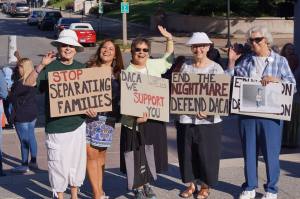This essay first appeared in the June 3, 2018, edition of the Springfield State Journal-Register, in the Beliefs column, to which Sister Beth Murphy is a frequent contributor.
Tu eres mi otro yo. You are my other self.
It was Msgr. Arturo Bañuelas speaking, the pastor of St. Mark’s in El Paso, Texas, who last weekend addressed the 2018 graduates of Catholic Theological Union. Among them was my Dominican Sister Kelly Moline. She was the reason I was present to hear this passionate re-membering of what is, ultimately, at the ground of Christian commitment to the common good: Tu eres mi otro yo. “We are all intimately interrelated, interdependent, and essentially a sacred part of each other.”
This, too, is a message of today’s Catholic feast of the Body and Blood of Christ. Today we celebrate what theologian Ilia Delio calls the “dangerous memory” of Jesus, whose life, death, and resurrection memorialized in the Eucharist cause believers to be—and call us to act as if we are—the Body of Christ in the world.
During Mass today, after the consecration of bread and wine—sacramental sign of the presence of the risen Christ in the Eucharist—we will pray: “Grant that, by the power of the Spirit of your love, we may be counted…among the members of your Son, in whose Body and Blood we have communion.” Can it be that this is what Communion means? That we have communion with one another in the Body and Blood of Christ?
However inconvenient it might be, however challenging to our selfish desires, that is what it means. Then how, in the face of this belief—membership in the Body of Christ makes us responsible for and to each other—can we hide from the suffering and needs of our “other selves”?
Msgr. Bañuelas’ made a list of what happens when we forget the truth of human communion. Short-sighted biases, he called them, because they are ultimately self-destructive. The list is familiar: exploitation of women, racism, cynical indifference to the poor, militarism and violence, denial of climate change—in short, dehumanizing all human life and exploiting the universe. To dehumanize and to exploit any part of creation is to dehumanize our very selves and to weaken “sacred bonds” that transform neighbors into “other selves.”
Msgr. Bañuelas’ powerful commencement address was an unexpected, challenging preparation for today’s feast.
Days after the CTU graduation I heard from my sister who is gravely concerned for friends, a Guatemalan family in the process of becoming US citizens who are to be deported for reasons that make no legal sense.
A week after hearing Tu eres mi otro yo, I stood on the Statehouse steps with the parents of Miguel Perez, an Afghan War vet with PTSD who was thanked for his sacrifice with deportation to a country he hadn’t lived in since childhood.
And during the course of this week, I’ve seen the effects of a heartbreaking, terrorizing, shortsighted immigration policy that separates even pre-verbal infants from their parents at the border.
What are we becoming in the United States? “Our hearts and our lives shrivel,” Msgr. Bañuelas said, “when we remain silent about the sufferings of others.”
From his house in El Paso, Msgr. Bañuelas sees the “disgusting, 18-foot-high, racially motivated, politically charged symbol of hate, division, and death” that is the border wall between the U.S. and Mexico. “Support for this divisive wall comes from our inner walls,” he said. And our inner walls come from fear, which wounds and separates us from our own humanity. How is it that we have become so disassociated from our “sacred bonds”? How is it that we have forgotten Tu eres mi otro yo?


